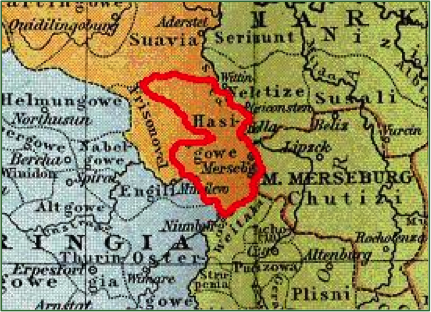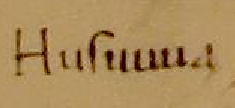Where does our family name originate?The Merseburg District (historically referred to as Hassegau) is within the southeastern corner of the current State of Saxony-Anhalt just 30km west of Leipzig, Saxony, Germany. It is the area between the towns of Mansfeld, Naumburg, Halle and Wettin. Up until 908AD, Hassegau was part of the Duchy of Thuringia, named after the Thuringii people who settled the region around 280AD. In 908AD the region became part of Eastphalia under the Duchy of Saxony. Gau is a German term geography used in medieval times roughly corresponding to an English shire, or a provincial subdivision within a region or state...roughly a county. Hassegau is known for mining of coal and precious metals and for “generating” some of the most prolific and famous German poets and writers.
|
What is the oldest written record of our family name?Between 830-860AD, in the Hersfelder Zehntverzeichnis (Tithe Directory for the Imperial Abbey of Hersfeld (written in Latin)), tithes were collected from “Husuwa”; which is the town of Geusa, Saxon-Anhalt, Germany. The long s indicates a harder sound more closely to an "-sz" (phonetically "Huszuwa"). This is the earliest known written evidence of our family namesake. Maps and ‘nobility maps’ dating back to 1000AD have the town marked as Geußau, Geißau, Geusau, Geußen and other variations. In the Pago Hassaga (noble land records for the region) dated 975 AD, the town name was marked as Gusau. The Wends and the Slavs invaded Saxony after 500AD and rose to power up until the 1200’s. Karl the Great checked them in the 9th century and Hassegau remained Germanic throughout, although it was immediately on the Eastern border with the Wendish and Slavic controlled lands and language lines blurred heavily.
What do genealogists say about our family name?According to multiple genealogists throughout the years, including Johann Heinrich Zedler in his 1735 Universal Lexicon (the most comprehensive encyclopedic work in Europe at the time), the origin of the family name of “Geuß” is “Geusau” (synonymous) from the Geisel River Valley in Hassegau. In fact genealogists have linked the origins of the following family names (and their derivatives such as –nitz, -ler, -feld, etc.) with Geusau: Geyso, Geysaha, Geisaha, Guszua, Guzewe, Guzowe, Gusowe, Gusewe, Gusow, Güsow, Güsaw, Gusau, Güsau, Geuß, Geus, Geuz, Gesau, Geussa, Geussau, Geusen, Geußen, Geisa, Geisau, Geis, Geiss, Göz, Geuße, Gans, Ganz, Ganse, Gänse.
Was our family a part of the nobility?Genealogists, including Zedler, state that Geusau was a baronial family of knights (Thuringian nobility) that were evangelical Catholics. The original family name "von Geusau" is frequently documented in royal records (such as the Castle Archive) and is why our family line was allowed heraldry.
|
Where in Germany can you find our family name? As you can see from the Geogen graphic at right, our family name is still relatively rare in Germany. The current, heaviest concentration of our family name is near Bamberg and Coburg. Notice the various towns with Geus- included in the name and the various breweries owned by a Geuß family member over the years. The following towns include Geus- in their name:
What is the family connection with brewing beer? Just as many Geuß family members worked in breweries and operated breweries in the US (St. Louis, Milwaukee, Indianapolis, Louisville, Central Illinois and Pennsylvania), the same is true in Germany. For example, a Johan (John) Geuß had a brewery in Maroldsweisach in 1870. Brauerei Andreas (Andrew) Geuß was in operation in 1858 in Specke (near Ebern) which also had a Georg Geuß listed in 1895 and 1902. In 1815 Brauerei Geuß in Altenbanz was founded by Adam Geuß and is still in operation today by his descendants. Research is underway to discover what links there may be between all of these breweries, as well as to our direct ancestors in the US.
|
|








